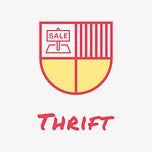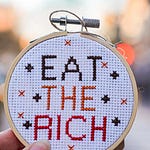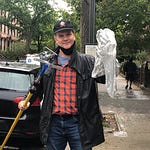Full episodes are available to everyone through Apple Podcasts on Thursdays. Paid subscribers get early access to new episodes right here on Substack. Interested in becoming a paid subscriber? You can read more about the perks here.

Episode show notes
Credits
Host: Maggie Blaha
Theme music: “Thanks for the Memory” written by Leo Robin and Ralph Rainger, performed by Bob Hope and Shirley Ross in the 1938 film of the same name
Background music: Night In Venice by Kevin MacLeod
Link: https://incompetech.filmmusic.io/song/5763-night-in-venice
License: http://creativecommons.org/licenses/by/4.0/
Season 3 opens with an episode about the future of estate sales and thrifting in a COVID-19 world. Maggie’s guests share their perspectives:
Brooke, an estate sale enthusiast based in Atlanta
Jess Master, the owner of vintage clothing store Miss Master’s Closet based in Brooklyn
David and Celeste, the husband-and-wife business Dial V for Vintage based in Philadelphia
You can find Thrift: What Your Garage Sale Says About You in a few different places on the internet. Choose how you want to follow and engage with us:
Instagram: @thriftpodcast
Facebook: @thriftpodcast
Twitter: @thrift_pod
And please be sure to rate and subscribe to the podcast on Apple Podcasts, which will help other people find Thrift.
The online thrift shop is slowly coming along, which you can visit on Poshmark at the handle @thrift_podcast. For more updates, you can follow the store on Facebook @thriftpodcastshop and Instagram @thriftpodcastshop.
Episode transcript
*Note about the transcript: Em dashes (‘—’) have been used to indicate when a speaker doesn’t finish a thought or when the conversation between 2 speakers overlaps. [Punctuation decision inspired by Greta Gerwig.]
INTRO
Maggie: You’re listening to Thrift: What Your Garage Sale Says About You, a podcast that explores how we can all be more community-minded citizens through thrifting.
[THEME SONG 30 SECONDS]
Maggie: I’m Maggie Blaha, and in this episode I want to start exploring how COVID-19 has impacted, and might continue to impact, secondhand shopping.
In the opening clip you heard Brooke talking about a few things she bought in the midst of this pandemic when she finally returned to estate sales. Brooke is a good friend who lives in Atlanta, Georgia, and I really wanted to get her on the show to talk about all the secondhand shopping she does. We’ll be hearing more from Brooke on a later episode this season, but on this episode we talked specifically about going back to estate sales in the age of COVID.
I haven’t really talked about estate sales on this podcast before. I’ve actually never been to one, so I’m going to rely on Brooke to explain how an estate sale typically differs from a yard sale.
[CLIP BEGINS]
Brooke: I have been a long-time fan of the estatesales.net search for the metro Atlanta area, and I’ve been kind of a hardcore thrift store person since my mom and grandma took me to yard sales as a kid.
This is just my distinction, but to me estate sales are more often about kind of getting to see the inside of the house itself, which is honestly a big part of the appeal. And a lot of times an estate sale happens because someone’s died or a family has to move for some reason. So it’s generally something that happens indoors and it’s kind of everything must go.
[CLIP ENDS]
Maggie: With estate sales, you do usually assume that the home and things within it belong to someone who has died. I asked Brooke if death is part of what makes estate sales interesting.
[CLIP BEGINS]
Brooke: Definitely part of the appeal is just creeping hard on other people’s possessions and the place where their possessions have been for generally a long time. But, lately, I will say that it does feel a little more morbid, just because death is a little more omnipresent and on everyone’s minds because of COVID.
Maggie: Do you know if any of the estate sales you’ve gone to have been for victims of COVID-19?
Brooke: Yeah, I don’t know. Sometimes if you hang around the front table, you’ll hear people asking what happened. But I’ve only been to maybe 3 since all this started, and I didn’t overhear anyone and I didn’t ask. My guess is that even if they had they probably wouldn’t tell us, because that might be off putting.
Maggie: It does seem like it would be a weird question to ask.
[CLIP ENDS]
Maggie: I tried to do some research on whether or not the number of people who have died from COVID in the US has had an impact on estate sales, but I only found information about some estate sales going virtual or how they’re safely starting up again. I can’t help thinking about how many of the families of COVID-19 victims are now having to cope with their loved ones belongings. What will happen to the stuff that once belonged to the more than 200,000 souls we’ve lost during this pandemic?
And in this new-normal world, how many of us will want to wear or own things that once belonged to someone else? COVID is a virus that makes it difficult to be present in a tangible world, to experience anything that requires a physical human interaction. Most stores you go into now have plexiglass barriers between you and a cashier. Libraries in Brooklyn are still only open for grab-and-go service, and only a handful of bookstores have opened for browsing. The majority of physical places you want to go encourage you to make online reservations and orders beforehand.
I wasn’t sure how many people would be having stoop sales this summer and fall. But after Governor Cuomo lifted the ban on yard sales on June 12, I slowly started to see the familiar signs for stoop sales written in chalk on sidewalks or posted on telephone poles. The #stoopsale is once again populated with listings on Instagram.
That’s how I found out about the stoop sales Jess Master started hosting over the summer to help raise money for charities like the Breonna Taylor GoFundMe, United Negro College Fund, and Urban Indigenous Collective. Jess is the owner of Miss Master’s Closet, and you might remember her from the season 2 episode ‘The Art of Bringing Clothes Back to Life.’ We’ll be hearing from Jess a lot this season, but for this first episode I wanted to hear how her vintage clothing business has been fairing during the pandemic.
[CLIP BEGINS]
Maggie: How do you think COVID might end up changing fashion and the fashion industry?
Jess: Well, I think that you have to think of it in a broader sense, like COVID is going to change everything. I think it’s going to change the way that people think and behave, and that will trickle down into art and then fashion.
I’m not really sure how it’s going to change things, I’m hoping that maybe more people will be open to buying secondhand and gently-used items. I’m hoping that some of the subscription wardrobe apps or subscription fashion apps like Wardrobe and StitchFix that people will start using them more because of the convenience of it—being able to select what you want online, having it sent to you. And places like Wardrobe that are actually, you know, promoting recycling. It’s kind of like Rent the Runway where you’re only wearing something for a certain amount of time, and then you choose when you’re done with it and you send it back and somebody else gets to use it. That is the mentality we should have about pretty much everything.
Maggie: Do you think that’s going to be something people are willing to do for a while? Wear something and pass it on to someone else?
Jess: You know, I’m really not sure. We’re still discovering more about the virus all the time. In the beginning I think we were being very cautious about how it reacts on surfaces, and we’re learning that that’s not as crazy. You know, we don’t have to leave our groceries in the pantry for 3 days before we can touch them again.
I think we’re going to get to know this virus better, we’re going to become more comfortable, it’s going to be the new normal, and hopefully eventually all of the germiness behind it will subside a little bit, so that we can have a little bit more of a life. I’m fine with the masks, let’s keep wearing masks as long as we have to, be washing our hands, disinfecting—
Maggie: All the things we probably should have been doing before the virus.
Jess: Yeah, but I do think there’s a bit more of a hyper awareness and a little bit of a germophobia that was already present but I think now will be exacerbated.
I’m not one of those people. Obviously working with vintage clothing you cannot be scared of germs, you cannot be scared of dirt. The things that you find in pockets it’s...I won’t even get into it.
[CLIP ENDS]
Maggie: The fashion industry has taken a hit during this pandemic—it turns out it was a bubble ready to pop like everything else in our society. But according to data published by Rachel Koning Beals for Market Watch back in June, the secondhand clothing market is still going strong. In fact, thredUp saw an increase in site activity during lockdown.
Despite the world being on fire and no one really needing to buy clothes, the online secondhand market is projected to grow 27% this year, while the broader retail sector is likely to shrink to 23%, based on this Market Watch report.
thredUP also reports that eco-brands like Patagonia and Allbirds have been generating 57% more interest on their site since COVID-19, which is probably because climate change is on all our minds.
David and Celeste, the owners of the vintage brand Dial V for Vintage in Philadelphia, actually opened their online store during the pandemic.
[CLIP BEGINS]
Maggie: You mentioned that Dial V for Vintage is a new business. What prompted you to get started?
David: We’ve been talking about it for years because we’ve definitely been running out of space, but we love buying so it was inevitable. And we talked to a lot of dealers who were like yeah, that’s how we got started. We just love buying, and to fuel that buying you have to sell stuff at a certain point.
And then, also, the pandemic helped push it because with being quarantined and Celeste, you know, not being able to see clients, it kind of forced us to put this ahead of everything and start seeing what we can do. And that’s really where that first push came from to start selling stuff.
Celeste: We had been doing in-person markets last year. Starting an Etsy story was always on the list of things to do, but we finally had time over quarantine to actually do it.
Maggie: Got it. I was going to ask about the Etsy store and whether you’d always planned to open one.
Celeste: We did. We were always just struggling to find the time to actually do it. I hated the quarantine but, thankfully, it let us be able to do something that had been on our to-do list for a couple years.
David: There are some positive things that come out of the world being put on pause. You don’t have all the stresses that you’re used to, and all of sudden you have time to figure out other things in your life that were being pushed aside.
[CLIP ENDS]
Maggie: Jess has also found more time to focus on projects for her vintage store, but that’s mainly because her main source of income in the restaurant industry was put on pause.
[CLIP BEGINS]
Jess: It’s been the biggest positive by far with this experience. The level of work I’ve been able to do, the level of concentration and depth that I’ve been able to get into things that I never had before because I always worked another job. This was the first time having my business that the business got to take first place, and I got to really concentrate on it, I got to work on more wacky projects that had been sitting on the backburner for a long time but were really ready to go. Luckily I have a lot of supplies that I’ve gathered over the years, and so I was pretty much self-sustained and able to do a lot of intensive creative repairs. And they’re still ongoing, absolutely.
I’m pushing myself to finish one piece that’s a 1920s devore or burnout velvet that was originally a dress that got converted into a top and a lot of the beading has gone missing over the years, so I’m rehabbing it. I gave it a very gentle wash, and I’ve spent at least 20, maybe 25 hours, re-beading it. I found a woman in Arizona who had vintage beads, and she was able to match the beads exactly for me. I’ve just been putting in about 5 hours every week, sitting and re-beading this top with these little silver glass beads.
[CLIP ENDS]
Maggie: While Jess has had more time for backburner projects, she definitely noticed a downturn in sales during the darkest days of lockdown.
[CLIP BEGINS]
Maggie: During lockdown, did you notice a downturn in sales?
Jess: Oh, absolutely. I mean, the end of winter / beginning of spring is normally the best quarter, the best time of year for my business. It was really starting to build up a bit right before and even while things were happening, and I was actually hitting a good personal business goal in the weeks before we went into real lockdown, and then everything just dropped off. I’ve been lucky to have a few sales here and there, and they’re starting to become more regular, which is nice.
[END OF JESS CLIP]
[CLIP BEGINS]
Celeste: I feel like our sales have been doing well. It’s hard to compare since we didn’t have the store open in advance. But, I mean, I know I’m super happy with the sales. And, you know, thankfully people are buying. Maybe that was it, that people are stuck at home. I know I was looking online for stuff since you couldn’t go anywhere.
It’ll be interesting to see what sales are like during the holiday season, since we didn’t have the store open during the last holiday season.
David: I think you’re right. I think with people being home and having nowhere to go, that definitely jump started things.
[CLIP ENDS]
Maggie: That was David and Celeste, talking about how their store has been doing since they launched. I certainly did a fair amount of online shopping while everything was closed, but I mostly shopped for antiques and home decor, not clothes, which is probably where David and Celeste have an advantage.
As we transition more and more experiences that we would normally have IRL online, I’m sure we’re all finding that there are just some things that don’t translate very well to the virtual world. Virtual yard and rummage sales aren’t anything new, nor are online estate sale auctions. Facebook alone has hundreds of groups dedicated to people in a community posting stuff for sale that they’re looking to get rid of.
But it’s just not the same as visiting a stoop sale or vintage store in person. I talked with Brooke about how much she was missing estate and yard sales.
[CLIP BEGINS]
Maggie: Did yard sales and estate sales in Atlanta stop for a while due to COVID?
Brooke: They still are limited, and I’ve seen a lot more online auctions for estate sales. But we hadn’t gone to one until maybe May, because it was right before Memorial Day, when COVID numbers had started to drop before they went back up again.
I mean all the ones I’ve been to, which has only been 3, have been very clear about masks being mandatory, distancing being required, only a certain number of people allowed in the home, and not being able to pay with cash, stuff like that. I’ll usually also bring an extra pair of gloves just to be extra careful.
But I do worry, and the last couple we’ve been to have felt safe in the exact same ways, we’ve had masks and all that stuff. But I just, in some ways, wonder if it’s me wanting it to be safe rather than truly knowing that it can be 100% safe.
I don’t know… I feel a little irresponsible saying it out loud that I’m not, that I don’t always feel 100% sure about it. It was something I missed so much when we straight up couldn’t do it, and I feel… Not to sort of hedge, but nothing in life can be 100%.
I think as long as I get there and it seems like the distancing is being taken seriously and that I see masks… And, also, all of them have hand sanitizer when you walk in. I mean we definitely try to get in and out, and not spend a ton of time there. It feels as safe as going to the grocery store. Probably safer because there are fewer people.
Maggie: I personally don’t feel unsafe about it. I mean, hell, I’m going out and picking up free books off the sidewalk.
Brooke: It doesn’t sound like COVID is something that really lives on surface areas for that long, so once that was something that we were kind of clear about we felt a lot better about secondhand shopping, because I missed it!
Maggie: How were you filling the void during that time?
Brooke: I discovered, well, I’ve known about Poshmark for a while now, but there was this J. Crew cardigan that for the full price was more than I would have wanted to pay for a cardigan, and I found 3 of them in 3 different colors for very affordable colors.
I guess I sort of filled the void with online shopping, but I also filled the void by just staring out the window and wondering when it’s all gonna burn.
[CLIP ENDS]
Maggie: Of course for David and Celeste there are benefits to running their business online versus setting up stalls at in-person events…
[CLIP BEGINS]
Celeste: I love doing in-person, too. I miss it! It’s so fun to talk to the people and see them get so excited when they see a piece.
I don’t foresee us doing another outdoor market until maybe next year. I’m not at that comfort level to get started with them again.
David: I’d much rather sit in my pajamas and sell stuff to people instead of loading up a truck and driving it somewhere.
Celeste: Yeah, I don’t miss that. It’s about the thrill of the hunt. It’s so different hunting for something and finding it unexpectedly than going online and just searching. It’s just not the same feeling at all.
David: But at the same time, you know, we’ve been working hard on the Etsy shop trying to fill— Like we have over 200 items on there right now, we’re still filling out more because the more you add, the more people like the look of the store, the more likely they are to come in and browse. It’s the same as if they like our booth. We have an eclectic amount of things so that you can maybe find something in our shop that you didn’t think you needed but, all of a sudden, there it is.
Celeste: With the internet, it’s nice to have access to things that you wouldn’t normally have access to. Ages ago when I first started collecting, you’d have to hope that you would find the piece somewhere, and it could take you forever. I’m OK with this, but it’s also nice sometimes when you just really want that piece or you’re buying it as a present, it is nice to just go online, find it, and buy it.
[CLIP ENDS]
Maggie: For Jess, she had to take a chance that people in NYC were ready to get back to stoop sales.
[CLIP BEGINS]
Jess: It was something that I was very thoughtful about. I would have liked to have started having them again sooner than I felt people were ready for. I waited until the end of June—
Hi guys!
Customers: Hi!
Jess: Everything’s 50% off.
Customers: Oh, cool.
Jess: Um, it’s tough because when you have a stoop sale you might have people congregate, and one of my main concerns was how am I going to regulate the social distancing. So I tried to be very thoughtful about how I set up the space so that people could social distance from one another, and that you can have one group come in while another group was already browsing. And then always have sanitizer options, so hand sanitizer and sanitizer wipes so that I can wipe stuff down after people have looked. And then people have the option of using hand sanitizer themselves.
I’ve kind of been feeling it out over these months and haven’t had any issues, people have been really good about— Or maybe I’ve just been lucky with timing. I’ve had people come by without masks on…
Maggie: Have you had to turn them away?
Jess: No, because luckily they were already in the space, and no one else tried to come into the space while they were there. But it was something I was prepared for. I mean, you should at least carry a mask on you, even if you’re riding your bike because you never know when you’re going to stop.
[CLIP ENDS]
Maggie: What came through in my interviews with Brooke, Miss Master’s Closet, and Dial V for Vintage is something we already know but aren’t sure what it’s going to look like just yet: We’ll need to get used to living with the threat of COVID-19.
It’s going to mean being open and willing to change. It’s going to mean taking steps to keep our communities safe.
I asked Jess, Brooke, David, and Celeste what they think the future of vintage and secondhand shopping will look like. I guess I have concerns that the beauty of browsing used bookstores, stoop sales, vintage shops will be lost to COVID-19. But everyone I interviewed in this episode is hopeful about what’s to come.
I think Brooke puts it best.
[CLIP BEGINS]
Brooke: I think in the time of this bullshit people are still going to die and need to get rid of their stuff, so my hope is that that stuff doesn’t just get dumped into a landfill. My hope is that that stuff is displayed in a way where people who appreciate the beauty of whatever it is can kind of take it and not create more waste.
I hope it’s something that’s able to happen safely, and I certainly do enjoy getting to creep on the inside of people’s homes, and it also feels more convenient for the people selling to be able to set up shop there.
It just seems like the reason for an estate sale to happen, which is that someone dies or a family needs to get rid of all their stuff for whatever reason is still going to happen. So I’d hate for it all to go to waste when it can instead go to my house.
[CLIP ENDS]
Maggie: Despite this pandemic, life goes on. If you can do so safely, I hope that you’re able to get back to stoop sales, shopping second hand, and doing other things you love soon.
[Where people can find the podcast]
Thanks for listening!
[OUTRO 30 SECONDS]













Share this post